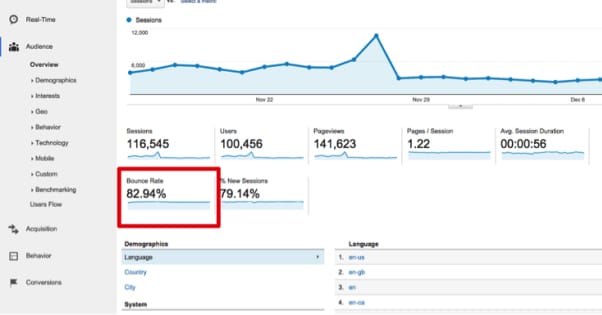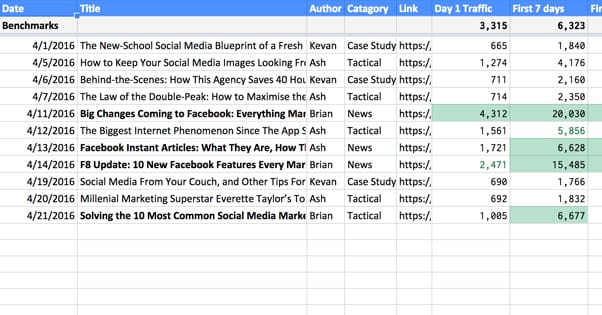5 Common Reasons Bloggers are Struggling to Get Readers
Published by James Parsons • Content Marketing • Posted November 7, 2016 ContentPowered.com
ContentPowered.com
Blogging is hard work. I can’t even list all of the individual bits of effort you need to put into it just to get a blog up and running, let alone trying to make one successful. At least, not if I wanted to have space in this post for anything else.
What really hurts is when you’ve put in all of that effort only to find your blog languishing. You publish and publish, but your traffic numbers are zilch, your social counts are invisible, and your brand has gone nowhere.
It is at this point that a crucial decision happens, but it’s one most people don’t realize they’re even confronting. It’s the choice of determination. Do you step back and analyze, figure out what’s wrong with your blog, fix it, and grow? Or do you walk away, declaring blogging to be a waste of time?
Time and again, I see people taking the second option. It’s not just with blogging, either. People who declare SEO a scam are experiencing the same thing with SEO. People who figure Facebook ads are a money-sink with no one but Facebook as the beneficiary are in a similar position. It all comes down to the capability of realizing when you’re doing something wrong.
I’m not advocating that you trust everything blindly. That’s how legitimate scams take advantage of gullible users. What I’m saying is that you should always take the time to step back and reassess your strategies. Determine if they’re working, if they could be working better, or if they’re just not working at all. Figure out why, fix the error, and keep an eye on them moving forward to see if you’re growing.
What I’ve put together below is a list of five of the most common causes of a blog failing to gain traction. These are issues I see time and again with small business bloggers and bloggers looking to start up an independent business. They put time and money into their site, but it all seems to go nowhere.
1. You’re Writing for the Wrong Audience
Imagine that you’re a freelance writer. You decide you want to start a blog to attract more clients. You start writing about topics that interest you. You have posts with titles like “How to snag more freelance clients” and “Learning how to say no to revision requests.” You get a decent number of hits, but you get no one looking to hire you. You continue posting but to your dismay, no one goes to your “hire me” page to find out your rates, let alone send a contact message.
What’s happening here? The answer is pretty simple. You’re writing about what you find interesting, rather than what the people who would hire you find interesting. The audience you’re attracting is composed mainly of freelance writers looking to up their game. They’re writers; they have no need to hire a writer. Even if they like your content, they aren’t going to follow your call to action.
What you need to do is dial back and figure out who your actual audience is supposed to be. In the freelance writer example, you’re looking for small business owners who have blogs of their own and who don’t have the time to write them themselves. You’re looking for people who want to hire a writer. Instead of writing content like the titles above, you’d want to write posts with titles like “Why your blog needs a dedicated writer” and “How investing in a writer can triple website conversions overnight.”
This advice goes for when you’re reaching out to try to guest post on other sites and get links back to your site, as well. A freelance writer trying to guest post on blogs about writing is going to see minimal returns. Why? The people reading a blog about writing aren’t going to be hiring writers. You need to look for blogs and sites that have audiences made up primarily of small business owners, sites like Inc or Business Insider.
2. Your Content Lacks Actionable Information
One of the easiest and clearest rules you can establish for your blog is “be insanely useful.” Try to make sure that every post you write has value to it, and not just passive value, but active value.
The blogs I see that fail tend to fail because their content is a meandering mess without any real point or information. The blogger picks a topic that sounds interesting, writes an educational overview of the topic, and moves on to the next. And, sure, maybe their readers are interested in that topic. Maybe it gets them some traffic. But it’s not memorable. It’s not useful. It’s not something the reader will come back to read again, or print out to read at their leisure.
Posts can have two kinds of value, the way I see it. The first is value as a reference. These blog posts are commonly seen on large sites, and often provide data either from the site itself or from a wide range of influential people. For example:
- The case study. If I were to go into detail about the past year of blog post topics, traffic numbers, marketing outreach and conversions, that would be detailed data other blogs could reference for their own posts.
- The influencer roundup. Every year around December, a lot of SEO and marketing blogs will start to produce content where they predict what 2017 will look like for their industry. Some will produce their own predictions, and will go back over their old predictions, like Moz. Others don’t have the reputation to pull that off, and will instead simply interview a list of a dozen or so influencers.
In either case, they are easily referenced throughout the year, like I just did.
The other kind of value a post can have is in actionable intelligence. These kinds of posts give the user some kind of immediate direction, and I don’t mean just the “fill out my form” CTA. Tutorials fall into this category, but your posts don’t have to be direct tutorials or guides. All you have to do is say something like “Make sure every post is directly useful to the reader” – as an example using this post specifically – and have a few other actionable tips. The general idea, even if the post itself isn’t geared towards it, is to have a few one-liner takeaways peppered throughout. Even if people don’t remember the post as a whole, they can remember the takeaway.
3. Your Site Lacks Focus
This is a common problem I see with bloggers who want to start businesses centered around their blog, or around some other form of media they’re promoting with their blog. For example, a blogger looking to Get Big in a certain industry with plenty of competition, or a blogger who thinks they can monetize a personal blog. Alternatively, someone producing YouTube content might produce a blog with a personal slant, hoping to gather an audience to funnel to their YouTube channel.
The problem these blogs often run into is the fact that they rarely have a central focus or a theme for their content. There are two ways this can go; extremely generic or just generic.
Extremely generic blogs are the personal blogs you might see on Tumblr or, years ago, on LiveJournal. They’re blogs more about your day, your hobbies, and your interests than they are about anything you could market. Very, very few people are interesting enough or have interesting enough hobbies to make it based solely on their own lives. People like Dan Bilzerian or other celebrities live interesting lives that the common folk want to get a glimpse of. Most people don’t live those kinds of lives, and their opinions, their day to day events, and their hobbies aren’t worth the attention.
Merely generic blogs are those that understand that they need a focus, but don’t understand just how deep that focus has to be. A site looking to write about video games can’t really go into it with the aim to “write about games” because there are hundreds of sites doing the same thing. You compete with Kotaku, with IGN, with PCGamer, and all sorts of other sites. Of course, gaming isn’t a great example simply because it’s so saturated even at the granular level. Many industries are the same.
You really need to pick a strong, narrow focus and go from there. Think of your blog like a needle, finding a tiny opening in the existing community where it can succeed. From there, as you gain success, you can expand.
4. You’re Not Encouraging a Community
A lot of blogs start off with little more than a WordPress installation and some content. They feel like they can establish some traffic first, then they can continue with other forms of marketing. The reality is that you need to be doing as much as you can to build a community from the outset.
The issue, I think, is that a lot of bloggers look at a blank comments section and think their community is empty. While it’s true that there may be no one there, there’s always one member in your community. That’s you. The initial members of your community are going to be people who find your content and want to engage with you about it. They have questions and want you to respond.
Your comments section isn’t the only possible place for a community to build, and frankly, it’s probably one of the least effective. The reason social media is so firmly tied with blogging these days is because it’s where the majority of your social engagement will come from. Simply having a Facebook page and a Twitter account might be all you need, though. You don’t need to dig into Google+ or Instagram or Pinterest. Only go where your audience is, which generally is going to be Facebook and Twitter.
Of course, then you have all of the issues of keeping social media profiles alive and active. I don’t have the space to go into it here, so just remember two things. First, you need more than just your own blog posts shared on your page, and second, you need to keep them active above all else.
5. You’re Not Spreading Yourself Around
When was the last time you went out and looked for a new blog to read? When was the last time you became a reader of a site based on some direct messaging from that brand? I’m guessing it’s been a long time.
The majority of people these days find their content through organic search or through social media. Most of the rest of them find it through links from one site to another. These three forms of exposure are all outside of your own site. You can’t simply create a blog and do nothing to promote it and expect it to be a success. It won’t be.
To get traffic from social media, you need to share your content, but you also need to advertise it. Boosting posts and ads will help you to some extent, but you need to put in the work to build a following to make these efforts more self-sustaining.
To get traffic from organic search, you need to go back up to the previous tips about focus and about reaching the right kinds of audiences. Knowing who you want to reach, knowing what they’re looking for, and producing that, will take you a long way.
To get traffic from other sites, you need to somehow get in their sights. You can do this by guest blogging for them. You can do it by finding broken links and recommending they replace them with content from your site. You can do it by submitting press releases about new flagship content to them. You can do it simply by producing high quality content that’s able to be referenced, and share it around as much as you can.









